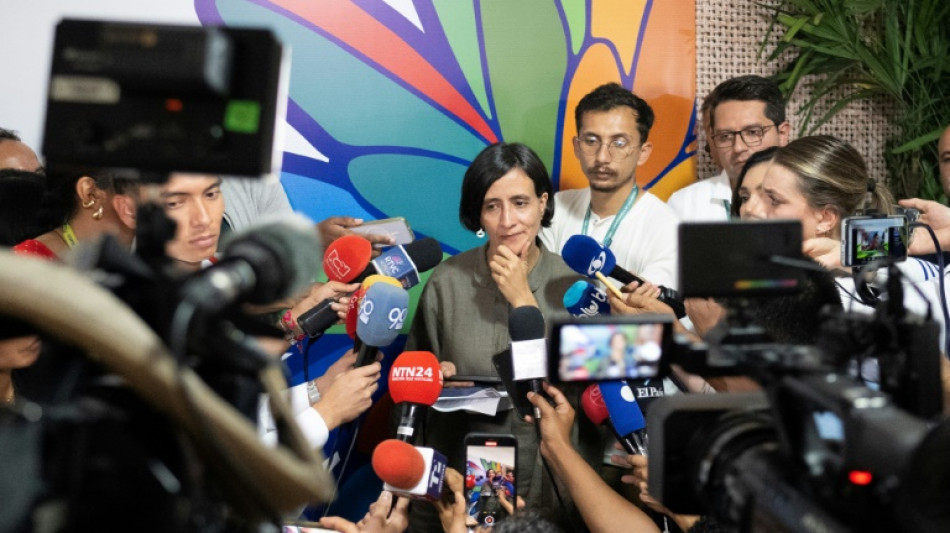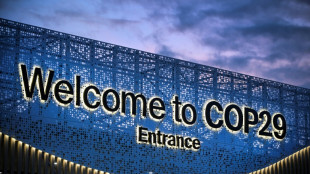
-
 Oil execs work COP29 as NGOs slam lobbyist presence
Oil execs work COP29 as NGOs slam lobbyist presence
-
Gore says climate progress 'won't slow much' because of Trump

-
 'Megaquake' warning hits Japan's growth
'Megaquake' warning hits Japan's growth
-
Stiff business: Berlin startup will freeze your corpse for monthly fee

-
 Wars, looming Trump reign set to dominate G20 summit
Wars, looming Trump reign set to dominate G20 summit
-
Xi, Biden attend Asia-Pacific summit, prepare to meet

-
 Kyrgios to make competitive return at Brisbane next month after injuries
Kyrgios to make competitive return at Brisbane next month after injuries
-
Dominican Juan Luis Guerra triumphs at 25th annual Latin Grammys

-
 Landslide win for Sri Lanka president's leftist coalition in snap polls
Landslide win for Sri Lanka president's leftist coalition in snap polls
-
Australian World Cup penalty hero Vine takes mental health break

-
 As Philippines picks up from Usagi, a fresh storm bears down
As Philippines picks up from Usagi, a fresh storm bears down
-
Tropical Storm Sara pounds Honduras with heavy rain

-
 Pepi gives Pochettino win for USA in Jamaica
Pepi gives Pochettino win for USA in Jamaica
-
'Hell to heaven' as China reignite World Cup hopes with late winner

-
 Rebel attacks keep Indian-run Kashmir on the boil
Rebel attacks keep Indian-run Kashmir on the boil
-
New Zealand challenge 'immense but fantastic' for France

-
 Under pressure England boss Borthwick in Springboks' spotlight
Under pressure England boss Borthwick in Springboks' spotlight
-
All Blacks plan to nullify 'freakish' Dupont, says Lienert-Brown

-
 TikTok makes AI driven ad tool available globally
TikTok makes AI driven ad tool available globally
-
Japan growth slows as new PM readies stimulus

-
 China retail sales pick up speed, beat forecasts in October
China retail sales pick up speed, beat forecasts in October
-
Asian markets fluctuate at end of tough week

-
 Gay, trans people voicing -- and sometimes screaming -- Trump concerns
Gay, trans people voicing -- and sometimes screaming -- Trump concerns
-
Argentina fall in Paraguay, Brazil held in Venezuela

-
 N. Korean leader orders 'mass production' of attack drones
N. Korean leader orders 'mass production' of attack drones
-
Pakistan's policies hazy as it fights smog

-
 Nature pays price for war in Israel's north
Nature pays price for war in Israel's north
-
New Zealand's prolific Williamson back for England Test series

-
 Mexico City youth grapple with growing housing crisis
Mexico City youth grapple with growing housing crisis
-
After Trump's victory, US election falsehoods shift left

-
 Cracks deepen in Canada's pro-immigration 'consensus'
Cracks deepen in Canada's pro-immigration 'consensus'
-
Xi inaugurates South America's first Chinese-funded port in Peru

-
 Tyson slaps Paul in final face-off before Netflix bout
Tyson slaps Paul in final face-off before Netflix bout
-
England wrap-up T20 series win over West Indies

-
 Stewards intervene to stop Israel, France football fans clash at Paris match
Stewards intervene to stop Israel, France football fans clash at Paris match
-
Special counsel hits pause on Trump documents case

-
 Japan's Princess Mikasa, great aunt to emperor, dies aged 101
Japan's Princess Mikasa, great aunt to emperor, dies aged 101
-
Cricket at 2028 Olympics could be held outside Los Angeles

-
 Trump names vaccine skeptic RFK Jr. to head health dept
Trump names vaccine skeptic RFK Jr. to head health dept
-
Ye claims 'Jews' controlling Kardashian clan: lawsuit

-
 Japan into BJK Cup quarter-finals as Slovakia stun USA
Japan into BJK Cup quarter-finals as Slovakia stun USA
-
Sri Lanka president's party headed for landslide: early results

-
 Olympics 'above politics' say LA 2028 organisers after Trump win
Olympics 'above politics' say LA 2028 organisers after Trump win
-
Panic strikes Port-au-Prince as residents flee gang violence

-
 Carsley hails England's strength in depth as understudies sink Greece
Carsley hails England's strength in depth as understudies sink Greece
-
Undefeated Chiefs lose kicker Butker to knee injury

-
 Wallabies winger Vunivalu signs for La Rochelle
Wallabies winger Vunivalu signs for La Rochelle
-
Musk met Iran UN ambassador on defusing tension under Trump: NYT

-
 Vinicius misses penalty as Brazil held in Venezuela
Vinicius misses penalty as Brazil held in Venezuela
-
World's tallest teen Rioux won't make college debut until 2025

| RBGPF | 100% | 61.84 | $ | |
| RELX | -0.37% | 45.95 | $ | |
| SCS | -0.75% | 13.27 | $ | |
| RIO | -0.31% | 60.43 | $ | |
| RYCEF | -4.71% | 6.79 | $ | |
| GSK | -2.09% | 34.39 | $ | |
| CMSD | -0.02% | 24.725 | $ | |
| CMSC | -0.24% | 24.55 | $ | |
| NGG | 0.4% | 62.37 | $ | |
| VOD | -0.81% | 8.68 | $ | |
| AZN | -0.38% | 65.04 | $ | |
| JRI | -0.23% | 13.21 | $ | |
| BCC | -1.57% | 140.35 | $ | |
| BTI | 0.2% | 35.49 | $ | |
| BP | 1.65% | 29.05 | $ | |
| BCE | -1.38% | 26.84 | $ |

Talks on halting nature loss enter extra time in Colombia
Negotiations at the world's biggest nature conservation conference entered extra time in Cali, Colombia, on Friday as talks deadlocked on funding for efforts to "halt and reverse" species loss.
A closing plenary session, scheduled for 6:00 pm Colombian time (2300 GMT), had not started more than three hours later as smaller groups of negotiators huddled behind closed doors in a bid to iron out their differences.
The 16th Conference of Parties (COP16) to the UN's Convention on Biological Diversity (CBD) opened on October 21 and was scheduled to close Friday, though many are now steeling themselves for a late night.
The conference, the biggest-ever meeting of its kind with some 23,000 registered delegates, is a follow-up to an agreement reached two years ago in Canada.
The Kunming-Montreal Global Biodiversity Framework that emerged from COP15 identified 23 targets to halt humankind's rapacious destruction of nature's bounty.
These included placing 30 percent of land and sea areas under protection and 30 percent of degraded ecosystems under restoration by 2030, reducing pollution, and phasing out agricultural and other subsidies harmful to nature.
It had agreed on $200 billion per year to be made available to protect biodiversity by 2030, including $30 billion per year from rich to poor nations.
- 'Cali Fund' -
COP16 was tasked with assessing, and accelerating, progress.
But negotiations on funding have failed to advance, observers and delegates say, even as new research presented this week showed that more than a quarter of assessed plants and animals are now at risk of extinction.
The Colombian presidency of the summit proposed a raft of last-minute draft texts for negotiators to consider as a way to end the stalemate.
One option was for talks on financing to continue after the summit -- and until the next one in Armenia in 2026 -- to find a "comprehensive financial solution to close the finance biodiversity gap."
Such talks would also assess the viability of creating a new, dedicated biodiversity fund -- a key demand from developing countries who say they are not represented in existing mechanisms, which are also too onerous.
- 'Cali Fund' -
Another point of contention is on how best to share the profits of digitally sequenced genetic data taken from animals and plants with the communities they come from.
Such data, much of it from species found in poor countries, is notably used in medicines and cosmetics that can make their developers billions.
COP15 in Montreal had agreed on the creation of a "multilateral mechanism" for sharing the benefits of digitally sequenced genetic information -- abbreviated as DSI -- "including a global fund."
But negotiators still need to resolve such basic questions as who pays, how much, into which fund, and to whom the money should go.
In a draft text for negotiators, the COP16 presidency proposed creating a new "Cali Fund" for the equitable sharing of DSI benefits.
Negotiators also remain stuck on the nature of a mechanism for monitoring progress toward the UN goals.
- 'Everyone has to cede' -
On Thursday, COP16 president Susana Muhamad, Colombia's environment minister, said the negotiations were "very complex."
UN chief Antonio Guterres, who stopped over in Cali for two days this week with five heads of state and dozens of ministers to add impetus to the talks, reminded delegates that humanity has already altered three-quarters of Earth's land surface and two-thirds of its waters.
"The clock is ticking. The survival of our planet's biodiversity -- and our own survival -- are on the line," he said.
Representatives of Indigenous peoples and local communities held demonstrations at COP16 to press for more rights and protections as delegates inside wrangled over a proposal to create a permanent representative body for them under the Convention on Biological Diversity.
On this, too, no agreement has been reached after nearly two weeks of talks.
The meeting was held amid a massive security deployment following threats from a Colombian guerrilla group with its base of operations near Cali.
M.White--AT



